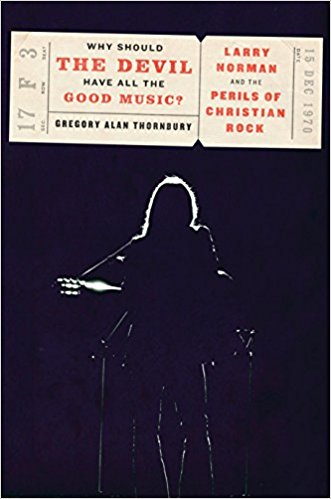Why Should the Devil Have All the Good Music?
Larry Norman and the Perils of Christian Rock
by Gregory Alan Thornbury
–Review by Teri Hyrkas
Why Should the Devil Have All the Good Music is quite a title for a book. Are you shocked or even offended by it? Would it surprise you to learn that this book title is also the title of a Christian rock song? Released in 1972, Why Should the Devil Have All the Good Music was written and performed by Christian singer-songwriter and leading figure in the Jesus Movement, Larry Norman. Norman (4-8-1947 to 2-24-2008) considered it his calling to prod and provoke complacent Christians with his music and concert performances. In the book Why Should the Devil Have All the Good Music (Convergent Books, 2018), Gregory Alan Thornbury tells the intriguing story of the life and times of Larry Norman, including a thorough examination of Norman’s major accomplishments and mammoth failures in the early years of the contemporary Christian music industry.
Larry Norman may not be a familiar name to you, but if you attend a church that has a service with a contemporary worship style, that is due in part to the influence of Larry Norman. Thornbury writes that Norman recalls how he “accepted Jesus without benefit of clergy” at age five, but despite his early association with the church, he did not begin his music career there. “[Larry] did not start out in the Christian music subculture then break out into the mainstream. He traveled the other direction, signing on to Capitol Records [in 1967] at the tender age of nineteen and releasing three albums on major record labels while starting his own underground record company in between.”
Thornbury states that during his secular music days, Norman appeared on the same bill with several big name rock stars, including Jimi Hendrix and Janis Joplin, the Grateful Dead, the Byrds, Jefferson Airplane and many others. There’s also a story that Norman had an elevator encounter with Paul McCartney who said he liked Norman’s music but advised him to stop talking about Jesus. Because Norman fraternized with so many world famous celebrities, including President Jimmy Carter, Thornbury calls him “… the Forrest Gump of evangelical Christianity.”
Larry did not stay at Capitol Records for long. The Jesus movement was gaining momentum and Larry was deeply involved in it, even being seen as one of the primary forces behind it. During the growth of the movement, Larry turned his attention, music, and influence toward the down-and-outers in LA. Thornbury writes: “After concerts Larry would stand around backstage, sometimes for hours, to talk to people. He generally refused to sign autographs, or make small talk, but if someone wanted to talk about his or her problems, or ask for prayer, he was in no hurry to leave.” Says Thornbury, “This was supposed to be the difference between Jesus rock and the secular alternative. One simply got feet tapping and hips moving. The other one opened up the heart, placed a person in a vulnerable position and gave a chance for the Holy Spirit to sneak into a person’s life — just long enough for them to feel changed, to imagine that life could be different. Somehow Larry’s music managed to do both.”
The growth of the Jesus movement and the growth of contemporary Christian music were simultaneous. Youth in the 1970’s were pushing away from the hippie culture with its empty promises of peace and spiritual enlightenment and they were dissatisfied with stuffy, traditional, mainline churches of the day. This made the radical message of new life in Jesus Christ very appealing, and, Thornbury notes, “…artists like Larry Norman and… gospel artist Andre’ Crouch were providing the soundtrack to this experience.”
This was the zenith of Larry Norman’s life, according to Thornbury. It was in this period that Larry came as close as he ever would to combining his desire to share Christ with the world by means of his music and also to provide a haven and a nurturing environment in which musical artists could develop and practice their art. Norman’s “artists’ colony” dream was the reason he launched his own music company, Solid Rock Records. Because, “Why should the devil have all the good music?” Indeed.
Greg Thornbury’s book is by no means a hagiography of Larry Norman. The author unflinchingly relates about the many conflicts in Norman’s life that offended Christians and puzzled non-believers. Thornbury writes, “…Larry Norman wanted it both ways; he wanted to rock and he wanted to talk about Jesus,…[he wanted] people to enjoy his music and be discomfited by it.”
Norman continued to write and perform until shortly before he died. He received numerous awards for his music and has been acknowledged for his lifetime achievements, which includes the release of over 100 albums. Thornbury tells us that, “In 2013 the Library of Congress added Only Visiting This Planet to the National Registry. It was an “American musical treasure,” according to comments released by the library at that time….Christian magazines somewhat grudgingly rated it “the greatest Christian record ever recorded” even before the federal government did.”
Norman died in 2008 at 60 years old from congestive heart failure. After his death, the Huffington Post ran a story identifying Norman as, “The Most Amazing Artist You’ve Never Heard Of.” It may be that Thornbury’s book, Why Should the Devil Have All the Good Music: Larry Norman and the Perils of Christian Rock Music, could help change that status.
(Many thanks to Jim Carlson, Larry Norman fan extraordinaire, who answered my barrage of questions about LN with wit and grace.)
“This biography is psychological in nature. I hope it forces people not just to scrutinize Larry’s life, but ideally their own.” Thornbury, G.A.(March 23, 2018) retrieved from The Stream online; interview by Esther O’Reilly
“Here is what I know about self-righteousness from the Larry Norman story: it will come back to haunt you, and it might even kill you.” GAT

